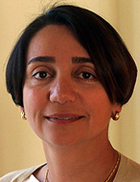Ph.D: PhD, University of California Los Angeles, 2011, History
Haleh Emrani’s research focuses on the position of women across the many religious groups of the Late Sasanian and Early-Islamic Iran, with emphasis on the legal regulations governing marriage, divorce, guardianship of women and their children, and inheritance.
In addition to her academic work, since 2003, she has been managing the Sasanika Project: Late Antique Near East Project, an online forum for the scholars of the Sasanian Period.
Publications:
Referred Articles
“Like Father, Like Daughter: Late Sasanian Imperial Ideology and the Rise of Boran to Power,” in Name-ye Iran-e Bastan: The International Journal of Ancient Iranian Studies, Issue 13, 2009, pp. 3-18.
“A Speech by Nour Hamada: Tehran, 1932,”Journal of Middle East Women's Studies - Volume 4, Number 1, Winter 2008, pp. 107-124.
Reviews:
Review of Jamsheed K. Choksy, Evil, Good, and Gender: Facets of the Feminine in Zoroastrian Religious History in Name-ye Iran-e Bastan: The International Journal of Ancient Iranian Studies, Issue 9, 2006.
Review of Bodil Hjerrild, Studies in Zoroastrian Family Law: a Comparative Analysis in Name-ye Iran-e Bastan: The International Journal of Ancient Iranian Studies, Issue 15-16, 2008-2009.
Review of Controverses des Chrétiens dans l’Iran Sassanide, ed. Christelle Jullien in Name-ye Iran-e Bastan: The International Journal of Ancient Iranian Studies, Issue 17-18, 2009-2010.On Science Technology Studies in Muslim Societies
Conference Presentations:
Societas Iranologica Europea: 7th European Conference of Iranian Studies, Krakow, September 6-10, 2011: “Marriage Customs of the Religious Communities of the Late Sasanian Empire: An indicator of Cultural Sharing”
Jewish Iranian Legacy: Life, Politics, and Culture: University of California, Irvine, October 3, 2010: “'Who would be mine for the day!': Jewish Marriage Customs of the Late Sasanian Period”
ISIS 2010: Eighth Biennial Conference of Iranian Studies, London, May 27-30, 2010: “Family law in Religious Communities of Late Sasanian and early Islamic Iran: An Indicator of Social Change and Continuity”
MESA 2009: 43th Annual Meeting, Boston, November 21-24, 2009: “Family Law in Religious Communities of the Late Sasanian Empire: Methods & Sources”
Societas Iranologica Europea: 6th European Conference of Iranian Studies, Vienna, September 18-22, 2007: “Like Father, Like Daughter: Late Sasanian Imperial Ideology and the Rise of Boran to Power”
ISIS 2006: Sixth Biennial Conference of Iranian Studies, London, August 2-5, 2006: “Sasanian Queen Boran & Other Female Rulers of her Age”



